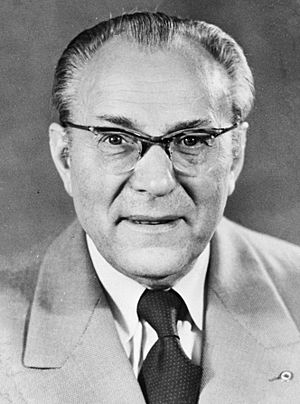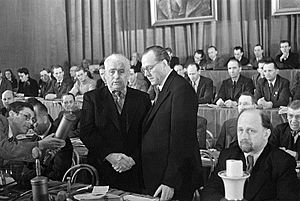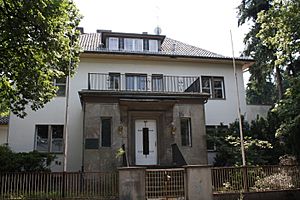Otto Grotewohl facts for kids
Quick facts for kids
Otto Grotewohl
|
|
|---|---|

Otto Grotewohl in 1964
|
|
| Chairman of the Socialist Unity Party of Germany | |
| In office 22 April 1946 – 25 July 1950 Serving with Wilhelm Pieck
|
|
| Preceded by | None (office created) |
| Succeeded by | Walter Ulbricht (as First Secretary) |
| Minister-President of the German Democratic Republic | |
| In office 12 October 1949 – 21 September 1964 |
|
| President | Wilhelm Pieck Walter Ulbricht |
| Succeeded by | Willi Stoph |
| Personal details | |
| Born | 11 March 1894 Braunschweig, German Empire |
| Died | 21 September 1964 (aged 70) East Berlin, East Germany |
| Political party | SED (1946–1964) |
| Other political affiliations |
USPD (1918–1922) SPD (1912–18, 1922–46) |
| Spouse | Marie Martha Louise |
| Children | 2 |
| Profession | Printer, politician |
| Military service | |
| Allegiance | |
| Branch/service | Army |
| Battles/wars | World War I |
Otto Emil Franz Grotewohl (born March 11, 1894 – died September 21, 1964) was an important German politician. He became the first prime minister of East Germany (also known as the German Democratic Republic or GDR). He held this position from when East Germany was founded in October 1949 until he passed away in September 1964.
Before becoming prime minister, Grotewohl was a member of the Social Democratic Party of Germany (SPD). He was active in politics in the Weimar Republic, which was Germany's government after World War I. After World War II, he led the SPD in the part of Germany controlled by the Soviet Union.
Grotewohl played a key role in joining the SPD with the Communist Party of Germany (KPD) in 1946. This new party was called the Socialist Unity Party of Germany (SED). He was a co-leader of the SED with Wilhelm Pieck until 1950. When East Germany was created in 1949, Grotewohl became the head of its government, leading the Council of Ministers of East Germany. He served under Walter Ulbricht, who was the main leader of the SED, until his death in 1964.
Contents
Biography
Early Life and Political Beginnings
Otto Grotewohl was born on March 11, 1894, in Braunschweig, Germany. His father was a tailor. Otto started working as a printer and joined the youth group of the Social Democratic Party of Germany when he was 16.
He served in the German Army during World War I. After the war, he began his political career. He became a leader in the Independent Social Democratic Party of Germany (USPD). In 1920, he was elected to the Landtag (state parliament) of Free State of Brunswick. He served as a minister in the Brunswick government, handling justice and education.
In 1922, Grotewohl and most of the USPD members joined the Social Democratic Party (SPD). In 1925, he became a member of the national Reichstag (Germany's parliament). He was re-elected several times in the early 1930s.
Life During the Nazi Era
After the Nazis came to power, Grotewohl was removed from the Reichstag. Like other SPD members, he faced unfair treatment. On March 23, 1933, he bravely voted against Adolf Hitler's "Enabling Act." This law allowed Hitler to make laws without the parliament's approval.
Grotewohl was arrested and imprisoned several times by the Nazi police. He was forced to leave Braunschweig and moved to Hamburg, then Berlin. In Berlin, he worked as a grocer and sales representative. He also joined a resistance group, which helped its members survive during the Nazi rule. In 1938, he was arrested again and accused of treason. He was later released. He was arrested once more after an attempt to assassinate Hitler in 1939. After his release, he worked as a clerk and spent more time painting. He managed to avoid being arrested again in 1944 and was not forced to join the Volkssturm (a Nazi militia) at the end of World War II.
Forming the Socialist Unity Party
After Germany lost World War II in May 1945, the country was divided into four zones. These zones were controlled by the United States, the Soviet Union, the United Kingdom, and France. Grotewohl helped restart the Social Democratic Party (SPD) in the Soviet-controlled zone. He became the leader of this branch.
The Soviet Union wanted the Communist Party of Germany (KPD) to become very strong in their zone. Soviet leader Joseph Stalin and KPD deputy leader Walter Ulbricht pushed for the SPD and KPD to merge. The SPD in the Soviet zone faced pressure to join with the KPD, even though the two parties had a history of not getting along. Some SPD members believed that the division between left-wing parties had helped the Nazis rise to power.
Grotewohl first disagreed with the merger. However, under pressure from Ulbricht and the Soviet authorities, he soon agreed to it. This decision was strongly opposed by Kurt Schumacher, an SPD leader in western Germany who was against communism.
In April 1946, the KPD and the eastern SPD merged to form the Socialist Unity Party (SED). Wilhelm Pieck from the KPD and Grotewohl from the SPD became the co-chairmen. Grotewohl's image appeared on the SED's logo, shaking hands with Pieck, to show the unity. Grotewohl was one of the few former SPD members who kept an important position in the new party.
In 1948, Grotewohl became the chairman of the committee that wrote the constitution for the German People's Council. This council was the early version of East Germany's parliament, the Volkskammer.
Serving as Prime Minister
On October 12, 1949, Otto Grotewohl became the first prime minister (Ministerpräsident) of the German Democratic Republic (East Germany). This happened five days after East Germany was officially established from the Soviet Occupation Zone. The SED was the ruling party.
Grotewohl was appointed Chairman of the Council of Ministers (Ministerrat), which was the official government of East Germany. At the same time, Pieck became the State President. Even though Grotewohl and Pieck were officially equal, Grotewohl had more real political power in state matters. For the first year of East Germany's existence, Grotewohl was the most powerful politician.
However, Grotewohl's power was greatly reduced in July 1950. The SED changed its structure to be more like the Soviet system. Ulbricht became the First Secretary of the SED's Central Committee. This made Ulbricht the true leader of East Germany. Grotewohl remained Chairman of the Council of Ministers and the official head of government. But he became more of a symbolic leader with less actual power.
Grotewohl was part of the group that signed the Treaty of Zgorzelec. This treaty recognized the Oder-Neisse line as the border between East Germany and Poland. In 1957, Grotewohl supported the Rapacki Plan, which aimed to create a zone in Central Europe without nuclear weapons.
Unlike Ulbricht and many other SED leaders, Grotewohl was known for favoring a less strict way of governing. In a speech on March 28, 1956, he spoke out against unfair practices in the legal system. He criticized illegal arrests, called for more respect for people's rights, and even encouraged open discussions in the Volkskammer. He also subtly criticized Justice Minister Hilde Benjamin for being too harsh in political trials. Despite his open criticism, Grotewohl kept his positions because the Soviet Union still trusted him.
Later Years and Death
Grotewohl was 55 years old when he became prime minister, and his health began to decline quickly during his time in office. He was often taken to the hospital in the 1950s for examinations. Doctors in East Germany found problems with his heart in 1953. He also received medical care in Moscow, Russia, where top Soviet politicians were treated. He used these trips to Moscow for political discussions with the Soviet leaders.
By 1955, doctors were very concerned about his heart. In 1959, they diagnosed him with early heart failure and told him to reduce his workload. They worried he might have a heart attack due to high blood pressure and an irregular heartbeat.
In 1960, Grotewohl was diagnosed with leukemia. His health got much worse, and he could barely participate in daily political work. He took several long holidays for his health. At the end of October 1960, he asked his deputy, Willi Stoph, to be acting prime minister, though Grotewohl officially remained in office. His health problems prevented him from returning to active politics. His eyesight also faded, making it hard for him to read or give speeches.
Despite his poor health, he did not resign. In September 1960, Grotewohl became Deputy Chairman of the State Council of East Germany. This new group was formed after Wilhelm Pieck, the president, died in 1960.
Otto Grotewohl passed away on September 21, 1964, in East Berlin. He died from complications of a brain hemorrhage. After his death, the East German flag on the Brandenburg Gate was lowered to half-mast. The government ordered a three-day mourning period. His ashes were placed in an urn at the Zentralfriedhof Friedrichsfelde cemetery on October 15.
Legacy
After his death, a street in East Berlin called Wilhelmstrasse was renamed Otto-Grotewohl-Straße in his honor. This street kept the name until 1991, after German reunification. In 1986, a subway station in eastern Berlin was also renamed Otto-Grotewohl-Straße. A German school in Moscow was also named after him.
Personal Life
Otto Grotewohl was married to Marie Martha Louise Ohst from 1919 to 1949. They had two children, a son named Hans and a daughter named Dorle. His son, Hans Grotewohl (1924–1999), became an architect. In 1954, Hans was sent by his father to lead a German team helping to rebuild Hamhung, North Korea, after the Korean War. In the same year he divorced Ohst, Grotewohl married his secretary, Johanna Schumann.
He enjoyed painting and was also an amateur filmmaker.
See also
 In Spanish: Otto Grotewohl para niños
In Spanish: Otto Grotewohl para niños
 | Emma Amos |
 | Edward Mitchell Bannister |
 | Larry D. Alexander |
 | Ernie Barnes |



